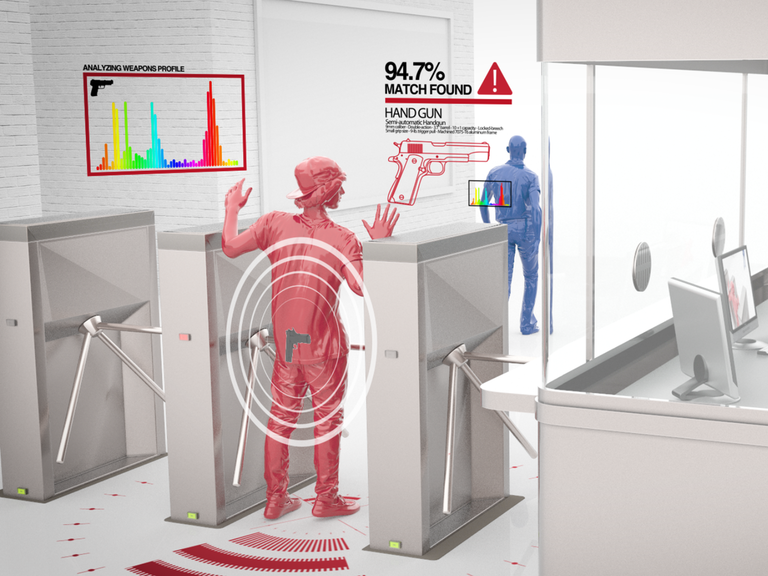
Under the CAD4.5 million co-investment, Patriot One is developing the capabilities of its PATSCAN VRS system, which was originally designed for detecting weapons and aggressive behaviour. The company is using the money to develop modules that can detect if people have elevated temperatures, measure if social distancing is being followed and even if people are wearing masks.
Patriot One envisions the detection systems could be deployed in hospitals, schools and care homes to name a few locations to help countries get back on their feet and control the spread of infection as lockdowns ease.
Patriot One CEO Martin Cronin told Army Technology: “The PATSCAN platform provides a network of advanced sensor technologies with powerful next-generation AI and machine learning software. The network can be deployed covertly, anywhere from a far perimeter to interiors, across multiple environments. Each sensor solution in the Platform identifies weapons, related disturbances or fights, or potential health and safety threats from contagious viruses by recognising elevated body temperature, face masks or contravention of social distancing rules, for immediate security response.
“These capabilities make it an invaluable detection tool to help detect and manage the spread of the Covid-19 virus.”
The company’s VRS systems were originally designed to pull in camera feeds and sensor data to detect firearms, offensive weapons and explosives while not having to put up cumbersome and intrusive sensors. The idea is that security checkpoints can become a point of attack for adversaries and by removing them someone with malicious intent can be caught with a tap on the shoulder rather than when they are going through traditional security apparatus.
To adapt the system to detect elevated temperatures and people not wearing masks, Cronin said the company’s platform uses the same premise as its threat detection base. It uses AI and machine learning to detect temperature anomalies and staff can then be warned of the possible danger that person could present. The system can pull in information from multiple or a single thermal imaging camera to build a picture of the temperatures of the people in its view.
How well do you really know your competitors?
Access the most comprehensive Company Profiles on the market, powered by GlobalData. Save hours of research. Gain competitive edge.

Thank you!
Your download email will arrive shortly
Not ready to buy yet? Download a free sample
We are confident about the unique quality of our Company Profiles. However, we want you to make the most beneficial decision for your business, so we offer a free sample that you can download by submitting the below form
By GlobalDataCronin explained: “The hardware was already in development for weapons detection but is now converted to enable the PATSCAN platform to detect body temperature anomalies. The system will run single or multiple thermal cameras for elevated body temperature and will consist of an edge computing laptop or a server with GPU capacity.
“Software with AI/machine learning and computer vision technology was configured to detect the changes in normal body temperature to elevated boy temperature with the thermal
camera. And the EO [electro-optical] camera for the detection of masks uses the same process we use to detect a gun in a person’s hand, which then requires training the solution for the detection of the presence of a facial mask.”
Outside of smaller, close-knit environments like hospitals and care homes, Patriot One is testing the utility of the systems across other settings including offices, sports stadiums and law enforcement facilities, All settings were the company’s traditional threat detection systems could be employed.
Commenting on the locations, Cronin said: “The platform can be deployed across a wide range of environments, including car-parks, building approaches, employee and public entrances and inside buildings as required.
“The elevated body temperature screening module can be used to quickly scan individuals or a queue of people entering a building in a controlled checkpoint environment. This includes offices, care facilities and other locations where it is important for incoming employees and visitors to be screened for possible elevated body temperatures indicative of fever from flu-like symptoms.”
Cronin went on to explain that the face mask detection module is ideal for use in more enclosed areas like offices, schools or universities, where it is more important that people wear masks to prevent the spread of Covid-19, and social distancing is harder to maintain.
A key difference between Patriot One’s system and traditional thermal imaging methods is the software element. Standard thermal imaging cameras alone can be inaccurate making them ineffective at effectively measuring someone’s temperature from a distance. The PATSCAN system can learn its environment, self-correct for variances making its detections more accurate.
Cronin said: “There are many integration efforts on the market that add a thermal camera to an existing system. However, thermal cameras have a wide variance band, making accurate screening difficult or ineffective.
“The PATSCAN VRS solution is different. Its AI core means it is trained to self-correct for a range of environmental variables, including camera to detection zone, the number of people present, screening area height, camera angle, fluctuating skin temperatures and weather conditions. This can be tailored according to the specific environment it is operating in and hugely improves the accuracy of screening.”



